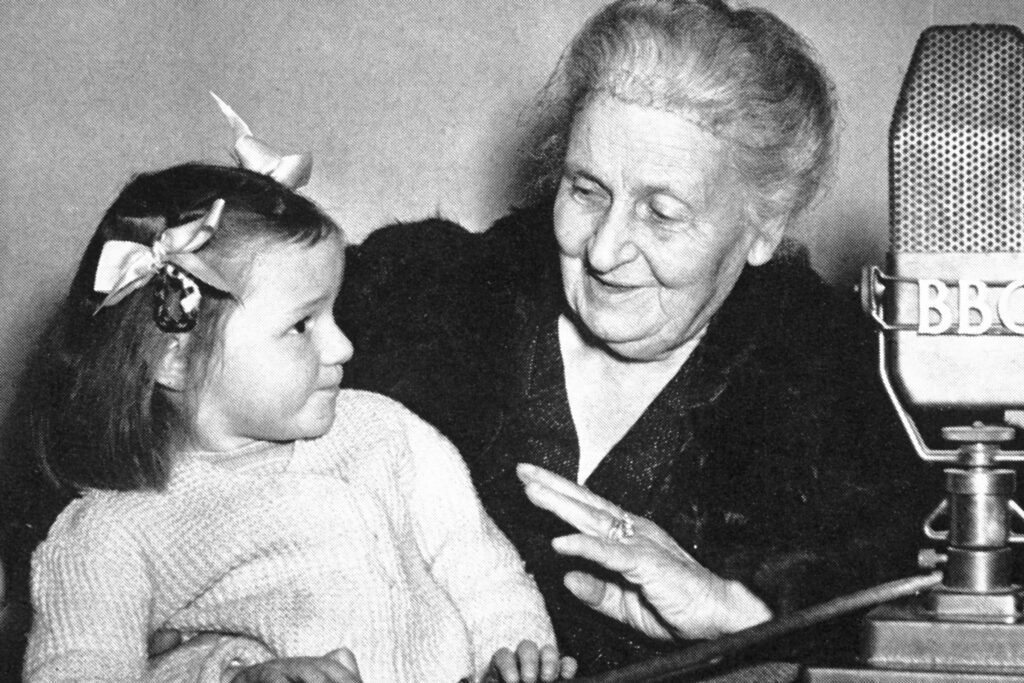This is Maria Montessori, the founder of the Montessori Method and school system. Her story captivated me years ago when I read her biography after my first baby was born. I am astonished by her attention to important details about human development, in awe of her fierce defense of children’s rights, and emboldened by her belief in each child’s potential.
Our second child is now in PreK in a wonderful Montessori school community. As I’ve attended various school workshops and gatherings, it’s dawned on me that Montessori’s discoveries are not limited to children. They are discoveries about human development, some of which can be useful to adults. For example, the Montessori curriculum honors the senses as a gateway to learning. How often do we, as adults, allow ourselves to sink into a sensory experience as we move through our days? How can we use touch, hearing, sight, smell, and taste to engage with our work and guide our learning and development?
I was so moved by a parenting workshop I attended at our child’s school that I raised my hand to design a workshop on “Montessori for Adults.” Over the past two decades, I’ve taught both children and adults (ESL, snowboarding, public policy, social and emotional skills, leadership) and I’m developing a desire to connect the worlds of child and adult development.
The purpose of this article is to shed light on how Maria Montessori’s legacy connects to adults engaging in leadership development. After all, adults, just like children, are worthy of the type of care and development offered by Maria Montessori.
A Montessori bridge from child to adult
Healthy children are born full of the will to grow. They are experts at using their senses to explore and learn. At some point(s) in our development into adults and throughout our adult lives, we lose connection with our will. Our senses dull. Our inner desires to continue growing and learning become muffled under the weight of all the extra baggage we acquire (and haven’t yet shed) through the years. The implications of this disconnection are serious: we must remember to exercise our agency, lest other forces decide our future paths for us.
Montessori for Adults Part 1
In February, I delivered that workshop I mentioned, to parents at my daughter’s Montessori school, entitled “Montessori for Adults.”
I argued that, just like children, we adults are continually learning about ourselves and our environments. We, too, are shaping ourselves and our environments, whether we are aware of this or not. By becoming more conscious of this process, we can use our agency to shape our selves and our environments in ways we choose.
A note on the power to change our environments: this simple equation is sometimes used in leadership education: Personality × Situation = Behavior. When we do not like our behavior, what is it that needs to change? More often than not, there’s a part of us AND a part of the environment that can be changed.
The Prepared Environment
Dr. Montessori noticed that children wilted when in a bland environment, e.g., hospitals with bare floors and walls with nothing to stimulate their senses. When the local government offered Dr. Montessori the chance to design a classroom, she focused on including only educational materials that children were drawn to. The rest she removed.
This process took time. At first, Dr. Montessori brought all the educational materials that she had available to her and placed them into the classroom. Noticing that children weren’t drawn to some of the materials, she removed them, leaving only those with which the children connected.
Imagine the patience and eye for detail she must have had!
Attending to our own prepared environment (bite-size)
Let’s turn our attention now to our own prepared environments. Close your eyes and visualize yourself walking through your day. What rooms and spaces do you spend time in? These are your “prepared environments” on a typical day.
Observing your typical day in your mind’s eye, what do you see that is superfluous?
Perhaps you were focused on what is in your home or office. Now, shift your focus to other collective spaces you spend time in. Many of us see superfluous constructs in our work places and communities, items or ideas that no longer serve the group’s needs and desires. How can we employ our individual agency (power) and our “grace and courtesy” to patiently and intentionally remove what is superfluous? How can we sustain our will to persist, so the work is ultimately accomplished?
~~~~~
That’s just a first bite, and I hope that’s just the right amount for now. There is SO MUCH MORE TO SAY about Maria Montessori’s discoveries and their relevance to our world today! More to come.
One last thought: The longer I’ve done this work, the more pace and commitment seems to matter, as opposed to speed and deadlines. Think about how much Dr. Montessori accomplished in the field of children’s education by pacing herself over her lifetime.
